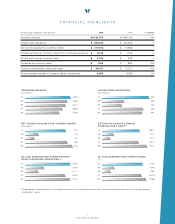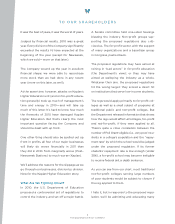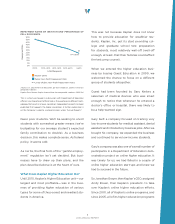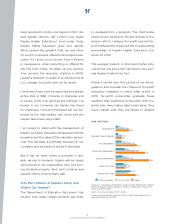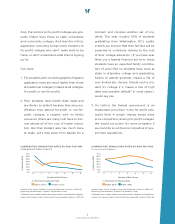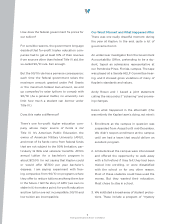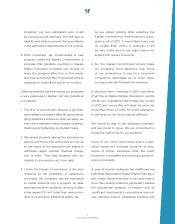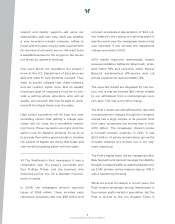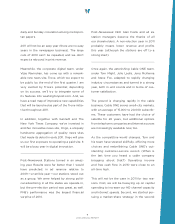Washington Post 2010 Annual Report Download - page 12
Download and view the complete annual report
Please find page 12 of the 2010 Washington Post annual report below. You can navigate through the pages in the report by either clicking on the pages listed below, or by using the keyword search tool below to find specific information within the annual report.
10
THE WASHINGTON POST COMPANY
half of 2010 by increasing the discounts on
bundled service, with great success. At the
same time, for the second straight year, we
likely won’t be raising cable rates, further eat-
ing into our profits.
While our prices are not going up, the cost of
programming content certainly is. Cable net-
works are inspiring each other to claim their
“fair share” of the monthly cable bill, which
has further inspired broadcast networks to
start claiming their “fair share” of the cable
bill, too, through retransmission consent fees.
(Smaller operators are disadvantaged both
ways here: “retransmission consent” is no
bonanza for Post–Newsweek Stations and a
problem for Cable ONE.) But Tom and his
team will manage through significant opera-
tional improvements (savings) and meaning-
fully higher volume.
Three corporate developments warrant men-
tion. First, we sold Newsweek. It makes me
sad even to write the words. My father, Philip
Graham, bought Newsweek in 1963; he, my
mother, my sister Lally Weymouth and I always
took great pride in the magazine and admired
the people who worked there.
We are very reluctant to sell businesses unless
they are losing money and we think they are
unlikely to return to profit. This was the case
at Newsweek. Combining with a large website
was always an interesting option. Newsweek’s
smart new owner, Sidney Harman, merged
it with The Daily Beast, under Tina Brown.
Everyone at our Company wishes Newsweek
great success in the future.
If you own shares of Post Company stock, you
own a larger percentage of our Company today
than you did a year ago. As the stock price
bobbed up and down during 2010 (mostly
down), we repurchased over a million shares of
stock out of roughly 9.3 million available at the
start of 2010.
When we went public in 1971, our Company
had almost 20 million shares outstanding; now
we have about 8.2 million. Our aim is to repur-
chase when doing so will make money for
shareholders (by buying at a time when the
Company is selling at less than the value of its
assets). We’ve never bought routinely, regard-
less of price.
Because of our 35-year o-and-on repurchas-
ing, a shareholder since those long-ago days
now owns almost two and a half times the
percentage of the Company he did in the
early 1970s.
It is also worth noting the performance of our
pension assets in 2010, both because the per-
formance is somewhat unusual and because
the results are recorded in a way you should
understand if you are examining newspaper
division results.
Our pension assets, managed by Ruane, Cunni
& Goldfarb and First Manhattan, had excep-
tional returns in 2010 that far outperformed
the S&P 500 stock index. Thus, unusually for



